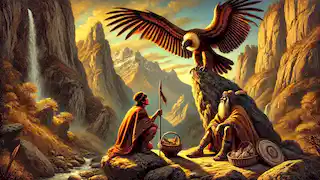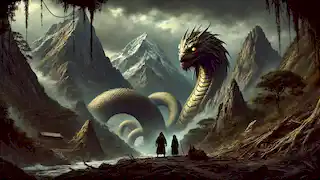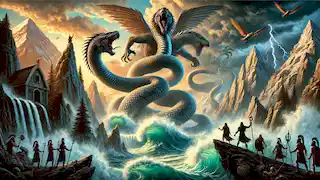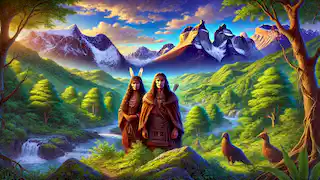In the lush valleys and rugged mountains of southern Chile, a proud and resilient people lived for centuries. The Araucano, or the Mapuche as they were later called, are a native people of the region, with a culture deeply intertwined with the land, nature, and spirits of the earth. This is the story of their origins, their struggles, and the legends that shaped their way of life. The Araucano's history is one of resistance, endurance, and a connection to the forces that govern life and nature. Their legacy lives on through the stories passed down through generations, tales of their ancestors' bravery, wisdom, and the divine forces that guided them. Long before the arrival of outsiders, the land that would become Chile was a peaceful yet untamed wilderness. The Araucano people believed they were born from the sacred union between the Earth Mother, Ñuke Mapu, and the Sky Father, Antü. These deities were responsible for creating the balance in nature and life. Ñuke Mapu gave birth to the forests, rivers, mountains, and fertile valleys, while Antü governed the sun, the moon, and the winds. According to legend, the first Araucano man and woman were formed from the earth itself. Ñuke Mapu shaped them out of clay, breathed life into their forms, and Antü kissed them with the warmth of the sun, granting them vitality and strength. These first humans, called Lituche and Kuyén, became the progenitors of the Araucano people. They lived in harmony with nature, honoring the spirits of the earth, the sky, and the waters, and in return, they were blessed with bountiful harvests and plentiful game. However, their peaceful existence would not last forever. One day, dark clouds gathered in the sky, and a great storm swept over the land. The winds howled, and the rivers swelled, threatening to wash away their homes. This was no ordinary storm; it was a sign from the gods that something was amiss. Lituche and Kuyén sought the wisdom of the village elders, who told them that the balance between Ñuke Mapu and Antü had been disturbed. The elders revealed that a powerful spirit from the underworld, Tren Tren, had awakened. Tren Tren was the serpent of the earth, a mighty being who controlled the mountains and caused earthquakes. It had slumbered for centuries beneath the land, but its rage had been stirred by the greed and disrespect shown by some of the Araucano people. To restore balance, the elders said, Lituche and Kuyén must embark on a journey to appease Tren Tren and ask for forgiveness on behalf of their people. With heavy hearts, Lituche and Kuyén set out on their journey. They traveled through dense forests and crossed raging rivers, their path lit only by the faint glow of the moon. Along the way, they encountered various spirits of the land—some friendly, others hostile. Each spirit tested their resolve, forcing them to prove their worthiness to approach Tren Tren. As they climbed the mountains, they met a wise old condor, who was said to be the messenger of Antü. The condor told them that Tren Tren was not their only enemy. Another serpent, Cai Cai, the spirit of the sea, had also awakened. Cai Cai controlled the ocean and the tides, and its goal was to flood the land, drowning everything in its path. The two serpents were ancient rivals, locked in an eternal struggle for dominance over the earth. The condor warned Lituche and Kuyén that if they could not appease both serpents, the Araucano people would be caught in the middle of a catastrophic war between the forces of the earth and the sea. Tren Tren would shake the mountains, causing landslides and avalanches, while Cai Cai would send massive waves crashing onto the shores, destroying villages and crops. Determined to save their people, Lituche and Kuyén continued their journey. After many days of travel, they finally reached Tren Tren's lair, deep within the mountains. The serpent rose from the earth, its massive body coiled around the peaks, its eyes glowing with anger. Lituche and Kuyén knelt before the great serpent and offered gifts of food and precious stones, hoping to appease its wrath. Tren Tren spoke in a voice that rumbled like thunder. It demanded to know why the Araucano people had forgotten the ways of their ancestors and had begun to take more from the land than they needed. Lituche and Kuyén explained that not all of their people had strayed from the old ways, and they begged Tren Tren to give them a chance to restore balance. Tren Tren listened, and after a long silence, it agreed to spare the Araucano people—on one condition. The serpent decreed that the Araucano must once again honor Ñuke Mapu and Antü, and they must never take more from the land than what was necessary for survival. In return, Tren Tren would protect them from Cai Cai's wrath. Lituche and Kuyén agreed to the serpent's terms, and with a great roar, Tren Tren sank back into the earth, restoring peace to the land. Though Tren Tren had been appeased, Lituche and Kuyén knew that their task was not yet complete. Cai Cai, the serpent of the sea, still threatened their people. They returned to their village and warned the others of the impending danger. The Araucano began to prepare for the worst, building fortifications and moving their homes to higher ground in case Cai Cai unleashed its fury. Days passed, and the sea remained calm. The villagers began to hope that perhaps Cai Cai had forgotten them, but Lituche and Kuyén knew better. One night, a great rumbling shook the earth, and the sea began to rise. Waves taller than the highest trees crashed onto the shore, sweeping away everything in their path. Cai Cai had awakened. The Araucano people fled to the mountains, seeking refuge from the floodwaters. Lituche and Kuyén led them to the highest peaks, where Tren Tren had promised to protect them. As the waves climbed higher, Tren Tren rose from the mountains once more, its massive body blocking the floodwaters. The two serpents clashed in a battle that shook the earth and roiled the sea. The sky turned dark as thunder and lightning filled the air, and the ground trembled beneath the Araucano's feet. For days, the battle raged on, with neither serpent gaining the upper hand. Lituche and Kuyén watched from the safety of the mountains, praying to Ñuke Mapu and Antü to guide them. Finally, with a mighty roar, Tren Tren unleashed its full power, causing the mountains to rise even higher. Cai Cai, unable to overcome the barrier, was forced to retreat back into the depths of the ocean. The floodwaters receded, and the Araucano people were saved. In the aftermath of the great battle, the Araucano people began to rebuild their lives. They had learned the importance of living in harmony with nature and honoring the spirits of the earth and sky. Lituche and Kuyén became revered leaders of their people, teaching the next generation the old ways and ensuring that the balance between Ñuke Mapu and Antü was never disturbed again. The legend of Tren Tren and Cai Cai became one of the most important stories in Araucano culture, passed down from one generation to the next. It served as a reminder of the power of nature and the need to respect the forces that governed their world. The Araucano people continued to thrive, living off the land and sea, but always with a deep reverence for the spirits that had saved them. As time passed, the Araucano would face many challenges—from the arrival of foreign invaders to the pressures of modernization—but they never forgot the lessons of their ancestors. The story of Tren Tren and Cai Cai became a symbol of resistance and resilience, inspiring the Araucano to fight for their land, their culture, and their way of life. Today, the Araucano, or Mapuche as they are now known, remain one of the largest and most influential indigenous groups in Chile. Their connection to the land and their respect for nature continue to shape their identity, even in the face of ongoing struggles for recognition and autonomy. The legend of Tren Tren and Cai Cai lives on, not just as a story of the past, but as a testament to the enduring spirit of the Araucano people. The Araucano believe that Tren Tren and Cai Cai still live, locked in their eternal struggle beneath the earth and sea. From time to time, their battles can be felt in the form of earthquakes and tsunamis, reminders that the balance between the forces of nature is fragile. The Araucano continue to honor their ancient deities, offering prayers and rituals to keep the spirits at peace. In the modern world, the Araucano's connection to the land has taken on new significance. As the global community faces environmental challenges like climate change and deforestation, the lessons of the Araucano people are more relevant than ever. Their belief in living in harmony with nature and respecting its power offers a model for how humanity can protect the planet for future generations. The legend of the Araucano people is not just a tale of the past, but a call to action for the future. It is a reminder that we are all connected to the earth and that our actions have consequences. Just as Lituche and Kuyén had to restore the balance between Ñuke Mapu and Antü, so too must we find a way to live in harmony with the natural world. The story of Tren Tren and Cai Cai teaches us that when we respect the forces of nature, we can overcome even the greatest challenges. The Araucano people's story is one of strength, resilience, and deep reverence for the natural world. Through their legends, they teach us the importance of living in balance with the earth and respecting the forces that shape our world. The story of Tren Tren and Cai Cai remains a powerful symbol of the Araucano's enduring connection to the land and their unbreakable spirit.The Birth of the Araucano People

The Journey to Tren Tren's Lair
The Wrath of Cai Cai

A New Beginning

The Eternal Struggle

Conclusion
The Legend of the Araucano People
Reading Time: 9 min

About Story: The Legend of the Araucano People is a Legend Stories from chile set in the Ancient Stories. This Descriptive Stories tale explores themes of Nature Stories and is suitable for All Ages Stories. It offers Cultural Stories insights. A gripping legend of the Araucano people, where nature’s balance is their only hope for survival.

















